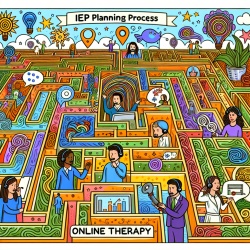According to the study, children with hearing loss often experience more behavioral and emotional challenges compared to their typically hearing peers. The research highlights that deficits in working memory and language skills are significantly related to socio-emotional functioning. Specifically, stronger working memory and language abilities are associated with better-regulated socio-emotional outcomes.
Key Findings and Implications for Practitioners
The study's results indicate several actionable insights for practitioners:
- Working Memory and Socio-Emotional Functioning: Higher working memory scores are linked to lower levels of inattention, hyperactivity, withdrawal, and atypical behaviors. Practitioners should consider incorporating working memory training into their interventions to support emotional and behavioral regulation.
- Language Skills and Socio-Emotional Functioning: Better language skills, including expressive and receptive vocabulary, are associated with improved social skills and reduced inattention. Enhancing language development through targeted therapy can positively impact socio-emotional functioning.
- Functional Communication: Teacher and parent reports of functional communication are strong predictors of language outcomes. Fostering functional communication skills, whether through verbal or non-verbal means, can support overall language and socio-emotional development.
Strategies for Implementation
Practitioners can leverage these findings to enhance their interventions:
- Integrate Working Memory Training: Incorporate activities that strengthen working memory, such as memory games and tasks that require holding and manipulating information. These can be tailored to the child's age and cognitive level.
- Focus on Language Development: Use evidence-based language interventions to improve both expressive and receptive language skills. This includes vocabulary building, narrative skills, and pragmatic language use.
- Promote Functional Communication: Encourage children to use any available means of communication to express their needs and interact with peers. This can include gestures, sign language, or assistive communication devices.
Encouraging Further Research
While this study provides valuable insights, it also underscores the need for further research. Larger sample sizes and longitudinal studies can help validate these findings and explore additional factors influencing socio-emotional functioning in children with hearing loss. Practitioners are encouraged to stay informed about emerging research and consider participating in studies to contribute to the growing body of knowledge.
To read the original research paper, please follow this link: Working Memory and Language Relate to Report of Socio-Emotional Functioning in Children with Hearing Loss.










